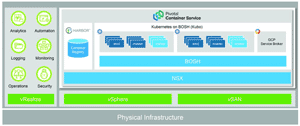News
VMworld Day Two Keynote Focuses on Containers
In a sign of how much things have changed for VMware, virtual machines were pushed aside for the cloud-friendly containers.
Yesterday's VMworld keynote was a high-level overview of VMware's long-range strategy and vision by VMware CEO Pat Gelsinger and VMware COO Sanjay Poonen. Tuesday's keynote session started with Gelsinger and Dell CEO Michael Dell answering questions from attendees.
These questions ranged from customer support (Gelsinger touted VMware's new Skyline proactive customer support product) to how Artificial Intelligence (AI) will change everything in our lives. The CEOs said they would stress the small/medium business (SMB) market in the future, while acknowledging their focus on the enterprise.
Pivotal Container Service
The big moment of the Day Two keynote was the announcement of the Pivotal Container Service (PKS). The "K" in PKS stands for Kubernetes. The idea behind PKS is to simplify deploying Kubernetes in a vSphere environment.
PKS has NSX -- VMware's software-defined networking (SDN) -- built in, and uses the Google Cloud Platform (GCP) Service Broker to integrate Google Cloud Services into containerized applications (Figure 1). PKS, in theory, will allow applications to float between on-premises datacenters and public clouds.
One interesting feature of PKS is that customers are guaranteed to always have the latest Kubernetes version available to them, and that it will maintain compatibility with the Google Container Engine (GKE) for the latest Kubernetes releases. PKS should hit general availability in Q4 of 2017.
 [Click on image for larger view.]
Figure 1. The Pivotal Container Service (PKS) architecture.
[Click on image for larger view.]
Figure 1. The Pivotal Container Service (PKS) architecture.
Later in the keynote, VMware CTO Ray O'Farrell brought up Chris Wolf, CTO, Global Field and Industry, to show how a fictional company (Elastic Sky Pizza) could use VMware technologies to transform itself from a company that used traditional datacenter technology to a leading-edge company delivering its product using cloud and mobile technology.
They stressed that the solution was based on VMware products including VMware Cloud Foundation, AppDefense, VMware cloud on AWS, vROPS (vRealize Operations) and WaveFront. A demo showed how PKS can ease the development and deployment of containerized apps.
O'Farrell closed the keynote by talking about the Internet of Things (IoT) and how VMware technology will allow AI to interact with devices using Functions-as-a-Service (FaaS). O'Farrell introduced Pulse IoT Center, an infrastructure management solution that enables IT and operational technology (OT) teams to control their IoT infrastructure.
Staying Relevant
Coupled with yesterday's keynote, VMware has shown that it has firmly embraced mobile technology and the public cloud. The company has been working hard to stay relevant in the datacenter, even though it could have rested on its hypervisor and milked it like the cash cow that it is, fighting tooth and nail against the onslaught of disruptive technology that could replace it.
It appears that VMware has taken another path; it's embraced public clouds, mobile computing and open-source products to build on its brand and stay relevant in the datacenter. There have been missteps, such as the email product Zimbra, but in all, VMware has proven that it's been willing to invest in the future to stay relevant in the datacenter.
About the Author
Tom Fenton has a wealth of hands-on IT experience gained over the past 30 years in a variety of technologies, with the past 20 years focusing on virtualization and storage. He previously worked as a Technical Marketing Manager for ControlUp. He also previously worked at VMware in Staff and Senior level positions. He has also worked as a Senior Validation Engineer with The Taneja Group, where he headed the Validation Service Lab and was instrumental in starting up its vSphere Virtual Volumes practice. He's on X @vDoppler.